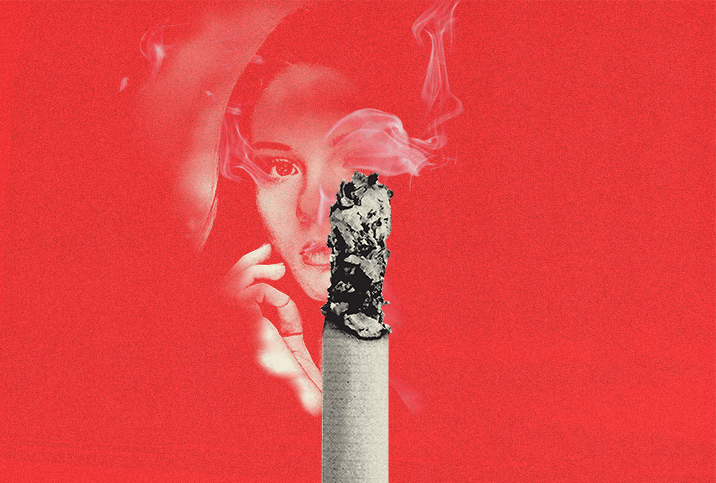Are Smokers at Higher Risk for Contracting HPV?

I started smoking a few years ago partly out of grief over my dad's death—he was also a smoker when I was younger—and partly over the stress of having to finish university and continue on with my life as if everything was fine. Many of my friends smoked, and what began as a social experience of stress relief quickly became a habit and coping mechanism for my very high levels of anxiety.
Quitting smoking is low on my priority list. But when I visited a clinic for a colposcopy, a procedure similar to a Pap smear, I realized the need to quit might be more urgent than I thought.
My experience
We all know smoking is linked to cancer, particularly lung cancer, as well as heart disease, stroke, diabetes, chronic obstructive pulmonary disease (COPD), emphysema and bronchitis. It can also increase the risk for tuberculosis, certain eye diseases, immune deficiencies and arthritis, according to the Centers for Disease Control and Prevention (CDC). But I was unaware that smoking could be linked to human papillomavirus (HPV) or any other sexually transmitted infection (STI).
In the United Kingdom, where I live, children are usually offered the first dose of the HPV vaccine around age 12 or 13. But I didn't grow up in the U.K., and for some reason never received the vaccine as part of my school's vaccination program or privately through my family doctor. It was only when I visited my doctor just a few months before the pandemic began, because I had experienced pain during and after sex, that my records flagged the absence of the vaccine. The doctor's staff offered me the first dose then and there and booked me for my second and third doses, three months and six months later, respectively.
The standard of sexual health education across the world has been a major topic of discussion for several years now, particularly for people with vaginas, who often anecdotally report a lack of focus on their specific issues or the information they need to know to keep themselves safe. Even in adulthood, many of us are unaware of what could go wrong with our vaginas or what is considered normal. I first heard of HPV only when my doctor offered me the vaccine; I then did further research into the virus and how it can manifest.
There are many different types of HPV, a virus that spreads through sexual contact. HPV often gets better on its own without intervention. Some types of HPV affect the mouth or throat, other types cause genital warts and some forms don't cause any symptoms. Around 13 types of HPV can cause cervical cancer, as well as cancers of the vagina, vulva, penis and anus. Approximately 8 out of 10 people are infected with HPV at some point in their lives—some people are totally unaware they have it.
Smoking harms your natural defenses
"We know from studies conducted on this that there is an association between smoking and an increased chance of anogenital HPV infection," said Najia Shaikh, a general practitioner for the National Health Service in London.
This association exists because smoking suppresses the immune system so it can't function properly, Shaikh explained. Without a fully functioning immune system, you are at higher risk of contracting any illness or infection—not just HPV—but smokers are more susceptible to HPV.
The complications don't stop there, Shaikh added.
"Long-term smoking has been shown to cause increased neoplastic growth, which leads to the growth of tumors," she said. "HPV also leads to abnormal cell growth, meaning if a smoker becomes infected with HPV, this can dramatically increase their chance of cancer, particularly cervical cancer."
Cervical cancer is caused primarily by HPV strains 16 and 18, which Shaikh and other medical experts dub "high-risk strains."
She also noted that even if you don't smoke, secondhand smoke also increases your risk of contracting HPV.
But what about people who already had or do have HPV and smoke, too?
"It is certainly harder for a smoker's immune system to fight off their HPV infection," Shaikh said. "Stopping smoking will make it easier."
She advised smokers who develop HPV to stop smoking as soon as possible, because smoking makes the body much more vulnerable to the infection. Additionally, smokers can boost their immune system in other ways, such as altering their diet to include lots of fruits and vegetables, taking vitamin supplements such as A, C and E, reducing or quitting alcohol intake and finding ways to reduce stress levels.
Quitting won't immediately make everything better
It takes time for the immune system to improve and possibly return to pre-smoking levels, but it is a good first step to help your body fight the infection and reverse any symptoms or abnormalities caused by HPV.
Corey Babb, a board-certified OB-GYN based in Oklahoma, agreed.
"As far as smoking cessation goes, you won't see an immediate improvement in immunity; it typically takes more than just a few hours to see that immunity level restored," Babb said.
Aside from addressing the risks of smoking, Shaikh highlighted that everyone should be more aware of sexual health. Getting regular Pap smears to check for cancerous cells, as well as using protection with sexual partners, go a long way toward HPV prevention for anyone, smoker or not.
"Whether you smoke or not, annual gynecological exams for wellness should be a routine that anyone with a vagina gets into," Babb said. "In terms of sexual transmission of HPV, the best thing you can do to prevent contracting the virus is to use some form of barrier protection: a male or female condom, preferably one made out of latex as opposed to lambskin or other, more porous materials."
He also recommended that all eligible patients should get vaccinated against HPV to prevent HPV-related cancers. The vaccine is highly effective in preventing serious illness resulting from HPV, should protection fail.
Shaikh emphasized that though there is a link between HPV and smoking, having one or a few cigarettes won't necessarily mean a person is more likely to contract HPV.
There is no upside to smoking—beyond looking like James Dean. We've known for a long time that smoking is not healthy for us by any measure of the word, but the effect on our sexual health can have serious consequences for our sex life and vaginal health in the future.


















